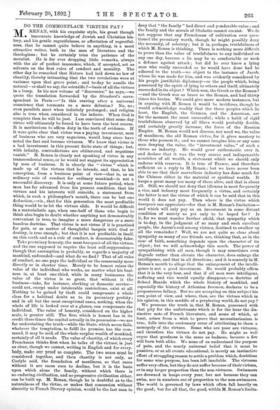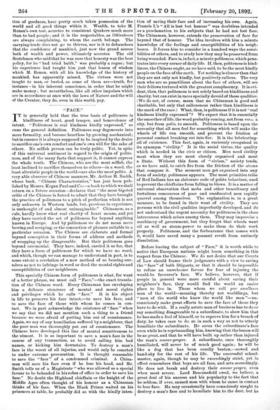DO THE COMMONPLACE VIRTUES PAY ?
MRENAN, with his exquisite style, his great though • inaccurate knowledge of Jewish and Christian his- tory, and his gentle regretfulness, or affectation of regretful- ness, that he cannot quite believe in anything, is a most attractive writer, both to the men of literature and the theologians ; but he certainly tries the patience of the moralist. He is for ever dropping little remarks, always with the air of perfect innocence, which, if accepted, act as solvents on the first rules of conduct and morality. The other day he remarked that Nature had laid down no law of chastity, thereby intimating that the two revelations were at variance upon that grave point ; and to-day he assails the natural – or shall we say, the scientific P—basis of all the virtues in a lump. In his new volume of "Souvenirs," he says,—we quote the translation forwarded by the Standard's corre- spondent in Paris :—" Is this craving after a universal conscience that torments us a mere delusion? No, no; even parallels meet when infinitely prolonged ; and religion also is true when considered in the infinite. When God is complete then he will be just. lam convinced that some day virtue will ultimately be found to have been the best course. It is meritorious to affirm duty in the teeth of evidence. If it were quite clear that virtue was a paying investment, men of business who are very sagacious, would long since have noted the fact and become virtuous. We know that virtue is a bad investment in this present finite state of things ; but, with infinity, contradictions are obliterated, and negations vanish." H. Renan is clearly not speaking of virtue in any transcendental sense, or he would not suggest its appreciation by men of business. It is clearly. the " virtue " which is made up of the virtues that he intends, and that, in his conception, from a business point of view—that is, as an ordinary rule of conduct for ordinary mankind—is not a successful discovery. It is only at some future period, when man has far advanced from his present condition, that his virtues and his interests will coincide, a statement from which, in such a philosopher's mouth, there can be but one deduction,—viz., that for this generation the most profitable thing would be to let the virtues slide. It would be difficult in a materialistic age, when one-half of those who begin to think also begin to doubt whether anything not demonstrably convenient is true, to imagine a more dangerous or a more baseless doctrine. That virtue is not virtue if it is practised for gain, or as matter of thoughtful bargain with God or destiny, is true enough ; but that it is not profitable in itself, on this earth and as a rule of conduct, is demonstrably false.
Take pecuniary honesty, the most bourgeois of all the virtues, and the one supposed to require the least self-suppression-- though that assumption is probably, as regards a majority of mankind, unfounded—and what do we find ? That of all rules of conduct, no one pays the individual or the community more directly or in shorter time. Merely to be honest raises the value of the individual who works, no matter what his busi- ness is, at least one-third, while in many businesses the value of the virtue is so great, that without it the business—take, for instance, clerking or domestic service— could not, except under intolerable restrictions, exist at all. Nothing to be gained by theft could compensate a whole class for a habitual doubt as to its pecuniary probity ; and in all but the most exceptional cases, nothing, when the whole of life is looked over at a glance, can compensate the individual. The value of honesty, considered on the higher scale, is greater still. The firm which is honest has in its credit three times the capital actually in its possession—we are far understating the truth—while the State, which never fails, whatever the temptation, to fulfil its promise, has the com- mand, it may be said, of the whole surplus wealth of mankind, certainly of all it needs. The value of chastity, of which every Frenchman thinks first when he talks of the virtues', is just as clear, though we cannot, writing in English and for every- body, make our proof so complete. The two sexes must he considered together, and then chastity is not only, as Carlyle said, the foundation of manliness, so that races without it are races sure to decline, but it is the basis upon which alone the family, without which there is no enduring civilisation, and no progressive civilisation either, can be built up. M. Renan, though he is doubtful as to the naturalness of the virtue, or makes that concession without sincerity to French literary opinion, would be the last man to deny that "the family" had direct and ponderable value ; and the family and the morals of Otaheite cannot coexist. We do not suppose that any Frenchman of cultivation ever ques- tioned the pecuniary worth, though he might possibly deny the necessity, of sobriety; but it is, perhaps, truthfulness of which M. Renan is thinking. There is nothing more difficult to prove than the value of truthfulness to any individual on any one day, because a lie may be so comfortable or such a defence against attack ; but did he ever know a lying man who really succeeded as he would have done had he adhered to the truth—we object to the instance of Jacob, whose lie was made for him, and was evidently considered by his people justifiable diplomacy—or the people which, being possessed by the spirit of lying to others and itself, ultimately succeeded in its object? Which won, the Greek or the Roman P —and the Greek was as brave as the Roman, and had thirty times his brains. We could give more modern instances, but in arguing with M. Renan it would be invidious, though he would acknowledge readily that the three peoples which lie least, the English, the German, and the American, are for the moment the most successful ; while a habit of rigid truthfulness observed by all Slays would probably double, and certainly greatly increase, the force of the Russian Empire. M. Renan would not discuss, nor need we, the value of manliness, the old Roman virtus, for it gives mastery to those who possess it ; and we cannot imagine him or any sane man denying the Value, the "investment value," of such a virtue as industry. He would grow enthusiastic over it, and declare that it was the very source and indispensable nourisher of all wealth, a statement which we should only endorse with reserves. It is true of France, and therefore sufficient as a reply to M. Renan ; but we have never been able to see that their marvellous industry has done much for the Chinese either in the material or spiritual worlds. It keeps a great many too many of them alive, and that is about all. Still, we should not deny that idleness is most frequently a vice, and industry most frequently a virtue, and certainly the latter is not the virtue of which it can be said that in this world it does not pay. Then where is the virtue which bourgeois can appreciate—for that is H. Renan's limitation— and which will only pay as an investment in some distant condition of society as yet only to be hoped for ? Is it, for we must wander further afield, that sympathy which is to-day, in the judgment of so many and such excellent people, the Aaron's-rod among virtues, destined to swallow up all the remainder ? Well, we are not quite so clear about sympathy as many of our friends are, thinking that, as in the ease of faith, something depends upon the character of its object; but we will acknowledge this much. The power of sympathising with all men, though it may sometimes even degrade rather than elevate the character, does enlarge the intelligence, and that in all directions ; and it is scarcely in M. Renan's mouth to allege that the enlargement of the intelli- gence is not a good investment. He would probably affirm that it is the very best, and that if all men were intelligent, suffering and vice would equally disappear,—a doctrine of School Boards which the whole history of mankind, and especially the history of Athenian freemen, declares to be a preposterous fallacy. But we are accepting on this subject his own point of view, and where, then, are the virtues which in his opinion, in this muddle of a perplexing world, do not pay ?
We presume the truth is, that M. Renan, possessed with that pity for the unfortunate which is for the hour the dis- tinctive note of French literature, and some of which, at least, arises from a wish to prove that necessitarianism is true, falls into the customary error of attributing to them a monopoly of the virtues. Some who are poor are virtuous, and therefore the virtues do not pay. He might as well argue that goodness is the same as badness, because a fire will burn both alike. We none of us understand the purpose of pain, and the nearly universal belief that it must be punitive, or at all events educational, is merely an instinetive effort of struggling reason to settle a problem which, doubtless for some wise purpose, has been left insoluble. The virtuous suffer very often, but they do not suffer because of their virtues, or in any larger proportion than the non-virtuous. Swimmers are drowned in heaps every year, but not because they oan swim, nor in numbers out of proportion to the non-swimmers. The world is governed by laws which often fall heavily on the good; but for all that, the good, within M. Renan's
tion of goodness, have pretty much taken possession of the world and all good things within it. Wealth, to take M. Renan's own test, accretes to consistent Quakers much more than to bad people ; and it is the respectables, as litaraleurs are always complaining, to whom the earth belongs. The carrying-trade does not go to thieves, nor is it to debauchees that the confidence of mankind, just now the grand source both of wealth and power, ultimately accretes. The old Scotchman who said that he was sure that honesty was the best policy, for he "had tried baith," was probably a rogue ; but his experience had taught him just that lesson of wisdom which M. Renan, with all his knowledge of the history of mankind, has apparently missed. The virtues were not taught to man, or buried, as some of them are—truth, for instance –in his inherent conscience, in order that be might make money ; but nevertheless, like all other impulses which are in accordance at once with the laws of Nature and the will of the Creator, they do, even in this world, pay.



































 Previous page
Previous page